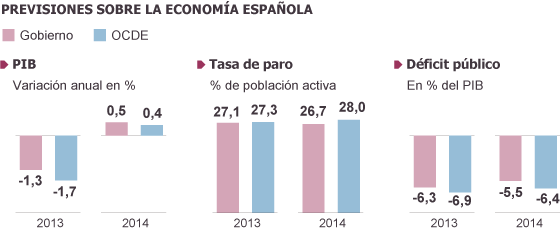OECDは、スペインの2013年の財政赤字はGDPの6'9%、2014年は6'4%、2013年の失業率は27'3%、2014年は28%に逹すると予想
La OCDE prevé que el paro escale al 28% y que el déficit apenas baje este año
El nuevo pronóstico anticipa un saldo público peor del fijado por el Gobierno para 2013 y 2014
"Impulsar el crecimiento debería ser la prioridad número uno", señala la OCDE a Rajoy
El PIB bajará un 1,7% este año, según el organismo, frente al 1,3% que augura La Moncloa
DESCARGABLE Informe de previsiones de la OCDE
Alejandro Bolaños Madrid 29 MAY 2013 - 12:12 CET

Fuente: OCDE y Ministerio de Economía y Competitividad. / EL PAÍS
The OECD predicts that unemployment will climb to 28% and lower the deficit just this year
The new forecast anticipates a worst public balance set by the government for 2013 and 2014
"Boosting growth should be the number one priority," said Rajoy OECD
GDP will fall by 1.7% this year, according to the agency, compared to 1.3% which bodes La Moncloa
DOWNLOADABLE Report OECD forecasts
Alejandro Bolaños Madrid 29 MAY 2013 - 12:12 CET
While European leaders groping a first effort against unemployment, five years after the outbreak of the Great Recession, destructive drift atenazadas economies by private debt and the rigors of austerity (administered by those same European leaders) do not expect. Economic forecasts are again a series of changes for the worse. This occurred less than a month with the Spanish government's forecast. And what appears now with the new provisions of the Organisation for Economic Cooperation and Development (OECD), recent worsening Executive estimates Rajoy, especially unemployment and public deficit.
The OECD estimates that the unemployment rate, which started the year with a new record (6.2 million unemployed, 27.16%), closed 2013 at 28%, and that is the average for 2014, far Executive's forecast Rajoy, who believes that the workforce reduction would lower the unemployment rate to 26.7% next year.
OECD urges reforms approved professional bodies and the electricity sector
Too bad the prognosis on the evolution of the budget balance, which has already the first signs of diversion in the early months of 2013. The international organization believes that the deficit will just fall this year: 7% of GDP in 2012 to 6.9% this year, at a discount compared to state aid to banks.
The Government believes that the final balance of 2013 will be 6.3% and that the extension of major tax increases, with minimal recovery, to shrink it to 5.5% in 2014. Here the gap with the OECD, which it has taken into account the most recent fiscal decisions Executive Rajoy, is extreme: in 2014, also provides for a significant cut in the deficit, which stood at 6.4% of GDP.
Both the increase in unemployment and the deficit-cutting scarce occur with growth forecast very similar to the Ministry of Economy in 2014 (a 0.4% vs. 0.5%) and slightly worse for 2013 (- 1.7% vs. -1.3%). "Boosting growth should be the number one priority of the government policy," the OECD analysis on Spain.
Calls to abolish the extension to negotiate agreements and addressing labor market duality
The international organization believes that the lack of growth, the weakness of the recovery, is more worrisome than the slow adjustment deficit. "The government should achieve its fiscal targets in structural terms, but let automatic stabilizers to operate freely," he adds. This means that adjustment note that some increases in spending (unemployment benefits, interest) are linked to the recession and sent when the recovery strengthens.
To revive growth, the OECD emphasizes the structural reform path. Claim that the projects announced to open competition in professional colleges and to change the electricity sector regulation come true. Considers that the labor reform has not done enough to end the "duality" between temporary and regular workers. And he also believes that the government should expand its employment policies, but stresses "positive steps" of the Spanish.
Moreover, the OECD believes that one should go beyond the labor reform to limit the negotiation of labor agreements when they expire. The amendment restricts the extension to a single year, but unions and employers agree just keep trading while both parties consider it appropriate and arbitration in case of dispute. The OECD, however, argues that the legal extension (one year) "should be totally abolished to give companies more flexibility in hiring in a situation of uncertainty."
0 件のコメント:
コメントを投稿